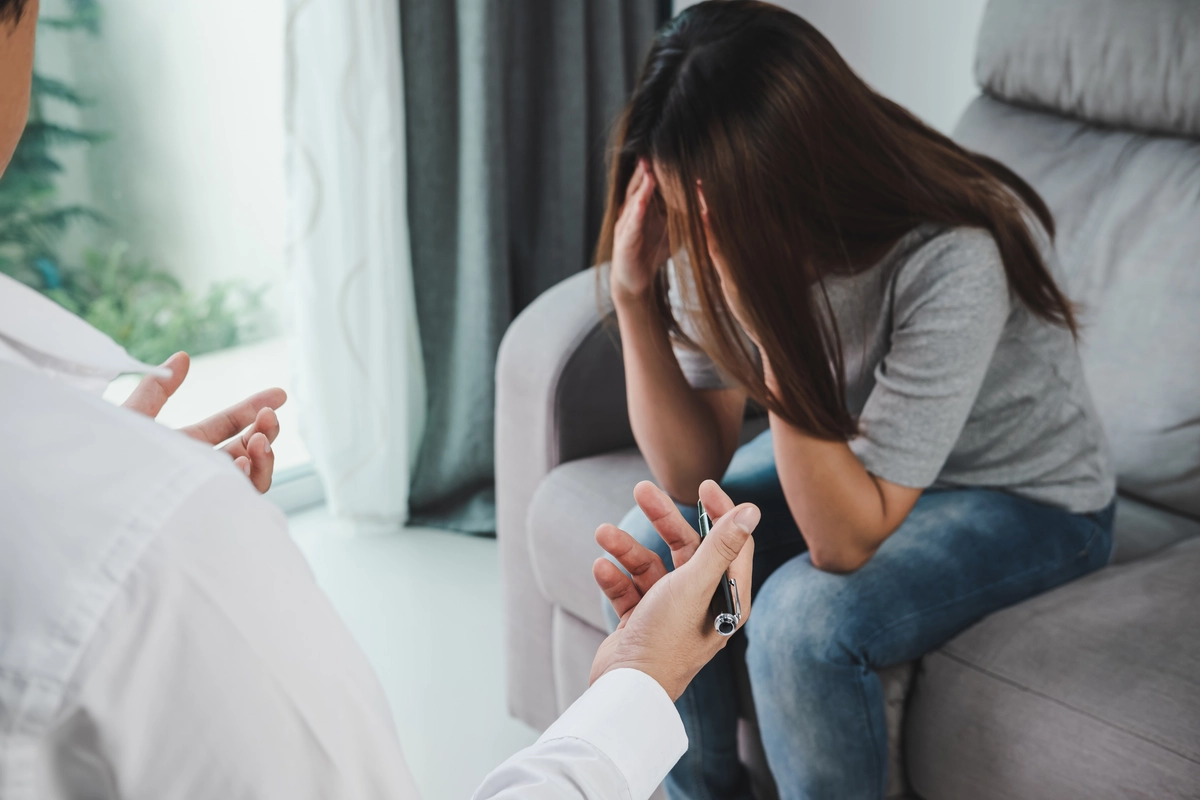24/7 Helpline:
(866) 899-221924/7 Helpline:
(866) 899-2219
Learn more about Opioid Rehab centers in El Dorado County

Other Insurance Options

Optima

Group Health Incorporated

AllWell

Providence

Amerigroup

United Health Care

MHNNet Behavioral Health

Health Partners

American Behavioral

State Farm

Ambetter

Health Net

Covered California

Coventry Health Care

Lucent

Carleon

Kaiser Permanente

Access to Recovery (ATR) Voucher

Magellan

Aetna

El Dorado County Health and Human Services Alcohol and Drug Programs
El Dorado County Health and Human Services Alcohol and Drug Programs offered outpatient programs foc...

Tahoe Youth and Family Services
Tahoe Youth and Family Services is a private rehab located in South Lake Tahoe, California. Tahoe Yo...

New Morning Youth and Family Services
New Morning Youth and Family Services is a private rehab located in Placerville, California. New Mor...

El Dorado County Behavioral Health Division
El Dorado County Behavioral Health Division is a public rehab located in Diamond Springs, California...

El Dorado Council on Alcoholism – Lifeskills
El Dorado Council on Alcoholism - Lifeskills is a private rehab located in Placerville, CA. El Dorad...

U Turn For Christ
U-Turn For Christ is a residential Christian Discipleship Re-entry Program. They provide the teachin...

Shingle Springs Tribal Health Program – Behavioral
Shingle Springs Tribal Health Program – Behavioral is a public rehab located in Placerville, Califor...

Elevate Addiction Services – Placerville
Elevate Addiction Services – Placerville is a private rehab located in Placerville, California. Elev...

Elevate Addiction Services – SLT
Elevate Addiction Services - SLT is a residential treatment program for those individuals struggling...

Progress House
Progress House offers outpatient treatment programs for those individuals in recovery from alcohol a...

Dover Behavioral Health Systems
Dover Behavioral Health Systems provides substance abuse treatment in Georgetown, DE to children, ad...

Sundance Rehabilitation Corporation
Sundance Rehabilitation Corporation is a private rehab located in Georgetown, Delaware. Sundance Reh...

Aquila – Georgetown
Aquila – Georgetown is a private rehab located in Georgetown, Delaware. Aquila – Georgetown speciali...

Thresholds
Thresholds is a private rehab located in Georgetown, Delaware. Thresholds specializes in the treatme...

Serenity Properties – Bramhall Street Women’s House
Serenity Properties – Bramhall Street Women’s House is a non-profit rehab located in Georgetown, Del...

Project Patch Ranch
Project Patch Ranch is a private rehab located in Garden Valley, Idaho. Project Patch Ranch speciali...

Bluegrass – Roach street
Bluegrass - Scott County is located in Georgetown, Kentucky. Bluegrass - Scott County assists indivi...

Spero Health – Somerset
Spero Health – Somerset is a private rehab located in Somerset, Kentucky. Spero Health – Somerset sp...

Addiction Recovery Care – Lake Hills Oasis
Addiction Recovery Care - Lake Hills Oasis is a residential treatment center for men suffering from ...

Breath of Life Counseling Services
Breath of Life Counseling Services stands as a comprehensive substance abuse treatment center in Som...

Anew Wellness
Anew Wellness offers outpatient treatment for individuals with alcohol and/or substance addiction. T...

Center for Great Expectations
Center for Great Expectations provides a safe place for women to engage in treatment, rebuild self-e...

Brightview – Georgetown Addiction Treatment Center
The Brightview Georgetown Addiction Treatment Center is a substance abuse rehab in Georgetown, OH. T...

Beal Counseling & Consulting
Beal Counseling & Consulting is a private rehab located in Somerset, Pennsylvania. Beal Counseling &...

Georgetown Alcohol and Drug Abuse Commission
Georgetown Alcohol and Drug Abuse Commission is located in the historic city of Georgetown, South Ca...

Counseling Center
Counseling Center is a private rehab located in Georgetown, South Carolina. Counseling Center specia...

The Arbor Behavioral Healthcare
The Arbor Behavioral Healthcare offers a continuum of addiction treatment programs based upon 12-ste...

Rock Springs
Rock Springs Health- Georgetown, located in Georgetown, Texas, is a behavioral health hospital that ...

Georgetown Behavioral Health Institute
Georgetown Behavioral Health Institute is a private rehab located in Georgetown, Texas. Georgetown B...










































































































































AA – Alcoholics Anonymous
AA – Alcoholics Anonymous is a non-profit rehab located in South Lake Tahoe, California. AA – Alcoho...

Sierra Recovery Center – Tallac Avenue
Sierra Recovery Center – Tallac Avenue is a private rehab located in South Lake Tahoe, California. S...

Progress House – Men’s Residential
Progress House – Men’s Residential is a drug and alcohol rehab that supports men struggling with add...

Sierra Recovery Center – Reaves
Sierra Recovery Center – Reaves is a private rehab located in South Lake Tahoe, California. Sierra R...

Progress House – Women and Children’s Residential
Progress House - Women and Children's Residential specializes in the treatment of women with chemica...

Tahoe Turning Point
Tahoe Turning Point - Treatment Center is a non-profit rehab located in South Lake Tahoe, CA. Tahoe ...

Tahoe Turning Point – Meyers House
Tahoe Turning Point – Meyers House is a private rehab located in South Lake Tahoe, California. Tahoe...

Progress House – Women and Children’s Residential
Progress House - Women and Children's Residential specializes in the treatment of women with chemica...

Sierra Recovery Center
Sierra Recovery Center is a private rehab located in South Lake Tahoe, California. Sierra Recovery C...

Willingness To Change
Willingness To Change is a private rehab located in Placerville, California. Willingness To Change s...

Sussex County Counseling Services
Sussex County Counseling Services is a private rehab located in Georgetown, Delaware. Sussex County ...

Fellowship Health Resources – Alcohol and Drugs Counseling
Fellowship Health Resources – Alcohol and Drugs Counseling is a private rehab located in Georgetown,...

Serenity Properties
Serenity Properties is a private rehab located in Georgetown, Delaware. Serenity Properties speciali...

Corinthian House
Corinthian House is a private rehab located in Georgetown, Delaware. Corinthian House specializes in...

Fellowship Health Resources
Fellowship Health Resources is a private rehab located in Georgetown, Delaware. Fellowship Health Re...

Kent Sussex Community Services
Kent Sussex Community Services is considered to be one of the major public outpatient addiction and ...

Hudson Health Services – Tau House
Hudson Health Services - Tau House is located in Georgetown, Michigan. Hudson Health Services - Tau ...

Catalyst Behavioral Health
Catalyst Behavioral Health provides a variety of mental health and substance abuse treatment for ind...

Counseling Association
Counseling Association is a private rehab located in Georgetown, Kentucky. Counseling Association sp...

Windows of Discovery
Windows of Discovery is a private rehab located in Somerset, Kentucky. Windows of Discovery speciali...

The Adanta Group – Pulaski County
The Adanta Group is a private, non-profit organization providing community-based mental health; subs...

Kentuckys Choice
Kentuckys Choice offers outpatient treatment for individuals with alcohol and/or substance addiction...

Renew Recovery
Renew Recovery - Eastside Drive is located in Georgetown, Kentucky. Renew Recovery - Eastside Drive ...

Oasis Care Center – Eagle Heights Church
Oasis Care Center – Eagle Heights Church is a private rehab located in Somerset, Kentucky. Oasis Car...

SperoHealth – Hardin Ln
SelfRefind specializes in evidence based substance abuse treatment, integrating a trauma informed re...

Hudson Health Services – Corinthian House
Hudson Health Services - Corinthian House is located in Georgetown, Michigan. Hudson Health Services...

Talbert House – Recovery Services
Talbert House - Recovery Services helps children, adults and families coping with addiction, mental ...

Cincinnati VA Medical Center – Georgetown Community Based Outpatient Clinic
The Georgetown VA Community Based Outpatient Clinic provides treatment for Chemical Dependency and B...

Twin Lakes Center for Drug and Alcohol Rehabilitation
Twin Lakes Center for Drug and Alcohol Rehabilitation is a non-profit rehab located in Somerset, Pen...

AA – Alcoholics Anonymous
AA – Alcoholics Anonymous is a non-profit rehab located in Georgetown, Texas. AA – Alcoholics Anonym...

Thriveworks
Thriveworks is a private rehab located in Georgetown, Texas. Thriveworks specializes in the treatmen...

The Right Step
The Right Step is a private rehab located in Georgetown, Texas. The Right Step specializes in the tr...












































































































































































































